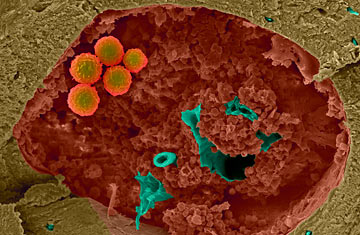
This adult human hematopoietic stem cell gives rise to specialized blood cells
(2 of 2)
The findings may herald a practical solution to the problem of embryonic stem cells, the controversial cells that can be derived only from embryos (researchers currently use embryos that have been discarded during fertility treatments). President Obama recently lifted the long-standing ban on federal funding of human-embryonic-stem-cell research, but still, these stem cells are unlikely to prove useful as human treatments — for maladies like diabetes, Parkinson's or spinal-cord injuries — since they would not be tissue-matched to the individual patients who need them. The new method could allow scientists to create stem cells using a patient's own skin cells, eliminating the possibility of rejection.
While the new iPS cells may be safer, even Lanza admits there is much that researchers still need to learn about how they will react once inside a patient's body. The most pressing question remains whether iPS cells — or the nerves, muscles or any of the 200 other types of tissues potentially generated from them — would act the same way as human embryonic stem cells, which were not created in a petri dish. "We don't know if iPS cells can do everything that normal human embryonic stem cells can do," says Lanza. "There are certainly a lot of questions we still have to answer." But having a population of stem cells that are safe for human use is an important step toward finding some of those answers.
